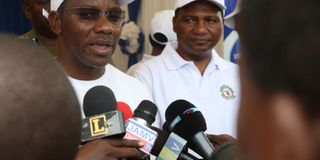Dar es Salaam Regional Commissioner, Paul Makonda on the Chop

Dar es Salaam RC Paul Makonda addresses journalists after opening Law Day exhibitions in Dar es Salaam yesterday. Right is High Court Judge Lameck Mlacha. PHOTO | SALHIM SHAO
Dar es Salaam. Dar es Salaam Regional Commissioner Paul Makonda has suddenly found himself in a public storm following a move by the US government to ban him and his wife, Mary Massenge, from stepping foot in the country.
The drastic move on Mr Makonda left many questions unanswered and would likely also put the government, where he is a powerful figure, in unwanted spotlight. Mr Makonda becomes the first government official in Tanzania in to be slapped with such a ban in recent history.
The seriousness with which the US was viewing the ban was amplified on Friday by the US Secretary of State, Mr Mike Pompeo, who took to his twitter account to reveal to the world the decision to designate Mr Makonda a person of interest under the law.
Mr Mompeo’s tweet was followed shortly after by a longer statement by the State department enumerating serious charges, some criminal, against the Dar RC. Mr Makonda has not made any public statement yet and snubbed journalists yesterday when asked about the ban.
Mr Makonda’s predicament immediately drew a frenzy on social media as Tanzanians tried to make sense of the ban. Speculations were rife what the US intentions were and what the move could portend to the government and the country.
Authorities in Tanzania were yet to make any pronouncements since the news broke out. Efforts to reach out to the spokespersons of the relevant ministries were also futile yesterday.
According to the US, Mr Makonda was banned over several reasons related to gross abuse of civil liberties. Among the charges were; “his involvement in gross violation of human rights, the flagrant denial of the right to life, liberty or the security of persons and his implication in oppression of the political opposition.” Other charges were “crackdowns of freedom of expression and association and the targeting of marginalized individuals.”
“The United States remains deeply concerned over deteriorating respect for human rights and rule of law in Tanzania. This includes actions taken by the government that curtail freedom of expression, freedom of association and rights of peaceful assembly, target marginased people and the political opposition and jeopardise life,” the statement noted.
The US usually leverages on visa bans on targeted government officials and businessmen all over the world to force action and accountability against them. The ban, according to past experience, could further trigger other sanctions against such targeted individuals, their families and even their close associates. “These actions against Paul Christian Makonda underscore our (US) concern with human rights violations and abuses in Tanzania,” the Pompeo statement read.
There were heated arguments by netizens who were discussing the implications of the Makonda ban, with opinion divided whether it remained a personal challenge or affect the relations between US and the government. Some called for his axing from the government, arguing he was notoriously controversial and has cost the government’s image dearly.
Ever since he was named regional commissioner, Mr Makonda has gone about his work with zest, but some of which his critics say has leaned toward the bizarre. From cracking on drug traffickers, smoking out deadbeat fathers and hunting down alleged homosexuals, Mr Makonda who emerged from the youth wing of the ruling party has stumbled from one controversy to the other.
He was famously filmed leading armed security personnel in a midnight raid of a private television station in the city in a scandal which led to the sacking of then information minister Nape Nnauye when he took him head on.
Opposition party officials have accused the RC, who wastes no time to wield his power to attain his end, of leading a shadowy security team which they have blamed on kidnap and torture of their supporters and critics of the government. Mr Makonda rarely replied to these claims but in several accession claimed he was being attacked for doing his work well.
He has at least cried twice in public to express his frustration with his critics, including during the time when he fought allegations of having forged his academic credentials.
Yesterday, Mr Makonda’s ban would become apparently a hot potato for some, with the Legal and Human Right Centre forced to drop from its pages a photo they had taken of the RC during a visit to the organisation’s stand at the ongoing law day exhibitions in the city. Executive director Anne Henga apologized after a backlash on social media of appearing in public with Mr Makonda.
Political analysts and diplomacy experts who spoke to The Citizen on the development expressed mixed view, with the former Centre for Foreign Relations lecturer and currently a consultant on diplomatic affairs, Dr Kitojo Weitengere, saying that the US move intended at forcing the government to adopt some favourable policies.
“In my honest opinion this is a move by the super powers to push their agenda on poor countries but they should be wary of retaliation,” warned Dr Kitojo.
Tanzania Human Rights Defenders Coalition coordinator, Mr Onesmo Olengurumwa, said the US move should be an alarm to Tanzania, especially on the erosion of human rights.
“Despite the fact that Tanzania doesn’t rate poorly in the human rights ranking, there is a reason to worry…the government must rectify some of issues, some of which are being raised by the US,” said Mr Olengurumwa, adding that there signs the country was moving on the wrong direction on an election year.
Former chairman of the Tanzania Constitution Forum, Mr Deus Kibamba, said the government shouldn’t downplay the US decision to ban Makonda from entering the US. “Makonda’s issue is not an isolated one, we should look at the matter in a broader picture…we should address the matter through consensus before it gets worse.”
Addition report by Frank Kimboy




